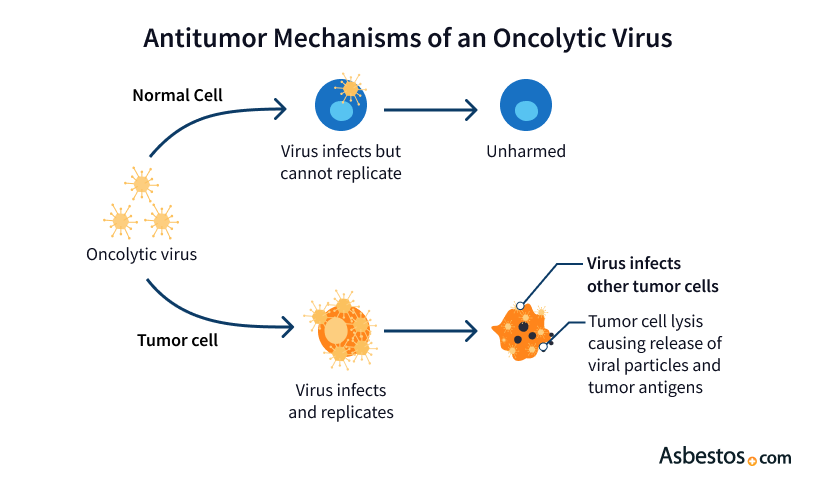
Virotherapy Treatment for Mesothelioma Patients
Virotherapy is a cancer treatment that uses oncolytic viruses and viral immunotherapy to destroy cancer cells directly or trigger the immune system to find and kill cancer cells. Clinical trials are studying virotherapy targeting mesothelioma cancer.

What Is Virotherapy?
Virotherapy is a cancer treatment that uses a virus to find and destroy cancer cells. It is a targeted treatment that can deliver therapy without harming healthy cells.
Viral therapy includes oncolytic virotherapy and viral immunotherapy. Another type is viral vectors, which is also called viral gene therapy.
How different types of virotherapy work:
- Oncolytic virotherapy uses viruses to infect and destroy cancer cells without affecting normal cells.
- Viral immunotherapy uses a virus to deliver an immune-stimulating substance called an antigen to the immune system.
- Viral vectors are laboratory-modified viruses designed to alter cancer cell genes to treat the disease.
Viral vectors also can deliver tumor antigens into the body. Antigens are substances found on cancer cells but not on normal cells. This process stimulates an antitumor immune response.
This mechanism is similar to how viral immunotherapy works. Sometimes, “viral vector therapy” and “viral immunotherapy” are used interchangeably.
Virotherapy is not a cure for mesothelioma. Researchers hope combining it with other therapies will help cancer patients live longer.
Access top mesothelioma cancer centers in the United States.
Get Help NowDr. Andrea Wolf, Thoracic Surgeon

How Virotherapy Works
Virotherapy uses viruses’ natural mechanisms, such as rapid reproduction, to target and destroy cancer cells. Different types of virotherapy can deliver medications, replicate antibodies and more.
Oncolytic Viruses
Oncolytic viruses infect cancer cells. Some viruses naturally infect cancer cells. Other viruses can be modified in the lab to target specific cancer cell types.
The viruses make their way into cancer cells and reproduce rapidly. The rapid viral reproduction ruptures the membranes of cancer cells and destroys them.
The destroyed cancer cells release antigens, substances more easily recognized as foreign by the body. This process stimulates the immune system to attack remaining tumors, too.

Oncolytic viruses seem to destroy tumors in two ways: first, by directly rupturing cancer cell membranes, and second, by indirectly stimulating the immune system to recognize and attack the cancer.
Researchers are also developing methods to combine gene therapy and virotherapy using oncolytic viruses. One example includes modifying oncolytic viruses to deliver p53 genes, which help the immune system fight cancer.
Viral Immunotherapy
Viral immunotherapy uses a virus to deliver an immune-stimulating substance called an antigen into the body. The antigen helps the immune system recognize and attack cancer cells.
A 2014 phase I clinical trial report published in the medical journal Oncoimmunology describes this type of virotherapy. Researchers evaluated the case of a 68-year-old man with asbestos-related malignant pleural mesothelioma (MPM).
The clinical trial used a type of virus called an adenovirus. The treatment is called ONCOS-102.
When a response is better than expected, the doctors may publish a report detailing these results. In the ONCOS-102 clinical trial, the man survived 18 months from treatment beginning and more than 33 months from diagnosis.
The study scientists reported the response as “remarkable”” given the median survival of patients with MPM varies from 4 to 12 months from diagnosis.
Phase I studies test a new treatment’s safety, side effects, best dose, and timing. The dose may be increased slowly to find the highest amount that does not cause harmful side effects.
Although phase I clinical trials are not designed to treat or cure patients, the ONCOS-12 clinical trial seemed to treat one participant more effectively than conventional therapy.
Viral Vectors
Viral vectors are created in the lab. Researchers start with a typical virus and alter it to make one that cannot cause disease.
This type of virotherapy is considered a form of gene therapy because the modified viruses alter genes in targeted cells. Targets can include cancer cells or other malfunctioning cells contributing to genetic diseases.
Some viral vectors target malfunctioning mesothelioma genes. One example of this approach uses a virus to disrupt how mesothelioma cells create the proteins that allow uncontrolled cell growth — a hallmark of all cancers.
Some of the most exciting technologies for mesothelioma cancer care involve DNA, gene manipulation or gene therapy. Genomic sequencing is going to be the future of personalized medicine.
In another approach, scientists have created a virus targeting mesothelioma genes that make too much of one growth factor. The virus only infects the cells with excessive amounts of the growth-promoting substance.
Viral vectors can kill cancer cells directly or make them more sensitive to conventional treatments such as chemotherapy and radiation therapy.
Virotherapy Side Effects
Like all mesothelioma treatments, virotherapy comes with potential side effects. Common side effects include flu-like symptoms such as fever, chills and fatigue, which result from the immune system’s response to the viral infection. These symptoms are usually mild to moderate and can be managed with supportive care.
In some cases, patients may experience more severe side effects, such as inflammation or swelling at the tumor site, nausea and vomiting. Rarely, an overactive immune response may lead to severe complications like cytokine release syndrome, where the body releases too many cytokines into the blood too quickly.
Cytokine release syndrome is a condition that can cause fever, low blood pressure, and, in severe cases, organ dysfunction. While virotherapy is a promising avenue for mesothelioma treatment, the risk of severe side effects highlights the need for careful monitoring and management.
Mesothelioma Virotherapy Clinical Trials
Modified versions of vaccinia, measles, adenovirus, herpes simplex and Newcastle disease virus are promising viruses for mesothelioma virotherapy.
These approaches have been studied in clinical trials, though none is approved for widespread clinical use yet. These treatments are only available to mesothelioma patients participating in clinical trials.
A 2021 clinical research study studied the CpHV-1 virus as a potential new mesothelioma virotherapy approach. The researchers found that CpHV-1 strongly synergized with cisplatin, a standard chemotherapy medication, and this agent combination did not affect healthy mesothelial cells.
Pharmaceutical companies, cancer centers and government research fund these studies. For example, the National Cancer Institute has funded some of these studies, including a clinical trial of virotherapy mesothelioma.
Additionally, specific research centers are conducting virotherapy research for mesothelioma. For example, the National Institutes of Health and Vaccine Immunotherapy Center conducts mesothelioma research on immunotherapy and virotherapy.
Combining Virotherapy and Conventional Cancer Treatment
Few studies have examined combinations of virotherapy and chemotherapy. Preclinical (animal) research suggests this approach may be very effective for treating mesothelioma.
One example of preclinical combination therapy research studied mesothelioma virotherapy, pemetrexed (Alimta), and cisplatin or carboplatin. Pemetrexed and platin chemotherapy drugs are the standards of care.
Medical experts accept this standard of care as an appropriate treatment for particular cancers. It is widely used by medical oncology professionals and typically is the first treatment offered when a person is diagnosed with mesothelioma.
This study found that chemotherapy alone did not decrease mesothelioma tumor growth. However, the virotherapy alone slowed tumor growth, and the combination of virotherapy plus chemotherapy delayed tumor growth even more.
The safety and immune-activating properties of this virotherapy in humans are already known. Chemotherapy is already the standard of care and is widely used to treat mesothelioma.
These factors provide a strong rationale for clinical trials testing virotherapy with first-line chemotherapy in patients with malignant mesothelioma. These trials likely will be coming soon.
Recommended Reading



